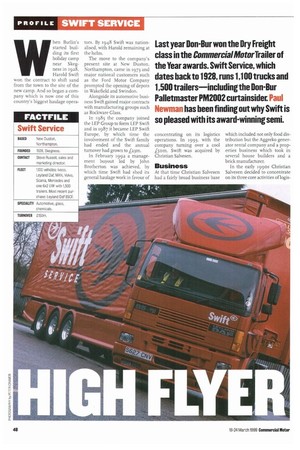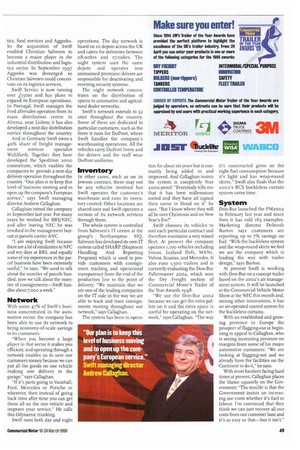VI hen Butlin's started building its first holiday camp near Skegness
Page 50

Page 51

If you've noticed an error in this article please click here to report it so we can fix it.
in 1928, Harold Swift won the contract to shift sand from the town to the site of the new camp. And so began a company which is now one of this country's biggest haulage opera tors. By 1948 Swift was nationalised, with Harold remaining at the helm.
The move to the company's present site at New Duston, Northampton, came in 1973 and major national customers such as the Ford Motor Company prompted the opening of depots in Wakefield and Swindon.
Alongside its automotive business Swift gained major contracts with manufacturing groups such as Rocicware Glass.
In 1985 the company joined the LEP Group to form LEP Swill and in 1987 it became LEP Swift Europe, by which time the involvement of the Swift family had ended and the annual turnover had grown to L23M.
In February 1992 a management buyout led by John Brotherton was achieved, by which time Swift had shed its general haulage work in favour of
concentrating on its logistics operations. In 1993, with the company turning over a cool kom, Swift was acquired by Christian Salvesen.
Business
At that time Christian Salvesen had a fairly broad business base
which included not only food distribution but the Aggreko generator rental company and a properties business which took in several house builders and a brick manufacturer.
In the early 199os Christian Salvesen decided to concentrate on its three core activities oflogis tics, food services and Aggreko. So the acquisition of Swift enabled Christian Salvesen to become a major player in the industrial distribution and logistics sector. In September 1997 Aggreko was demerged so Christian Salvesen could concentrate on its logistics services.
Swift Service is now turning over Lisom and has plans to expand its European operations. In Portugal, Swift manages the Ford aftersales operation from its main distribution centre in Alverca, near Lisbon; it has also developed a next-day distribution service throughout the country.
And in Germany Swift owns a 40% share of freight manage ment services specialist Wiihlfarth. Together they have developed the Spedition 2000 consortium, which enables the companies to provide a next-day delivery operation throughout the country. "Our plan is to keep this level of business moving and to open up the company's European service," says Swift managing director Andrew Callaghan.
Callaghan joined the company in September last year. For many years he worked for BRS/NFC, and after leaving NFC he was involved in the management buyout at parcels carrier ANC.
"I am enjoying Swift because there are a lot of similarities to NEC and my days at BRS, and equally some of my experiences in the parcel business have been extremely useful," he says. "We used to talk about the number of parcels handled, now we talk about the number of consignments—Swift handles about 7,000 a week"
Network
With some 47% of Swift's business concentrated in the automotive sector, the company has been able to use its network to bring economy-of-scale savings to its customers.
"When you become a large player in that sector it makes you efficient, and operating through a network enables us to save our customers money because we can put all the goods on one vehicle making one delivery to the garage," says Callaghan.
"If it's parts going to Vauxhall, Ford, Mercedes or Porsche or wherever, then instead of going back time after time you can get them all on the one vehicle and improve your service." He calls this Odynamic trunldng.
Swift runs both day and night operations. The day network is based on to depots across the UK and caters for deliveries between o8:00hrs and 17:oohrs. The night system uses the same depots and operates into unmanned premises: drivers are responsible for deactivating and resetting security systems.
The night network concentrates on the distribution of spares to automotive and agricultural dealer networks.
Swift's network extends to 32 sites throughout the country. Some of these are dedicated to particular customers, such as the three it runs for DuPont, where Swift handles the company's warehousing operations. All the vehicles carry DuPont livery and the drivers and the staff wear DuPont uniforms.
Inventory
In other cases, such as on its jewson contract, there may not be any vehicles involved but Swift operates the customer's warehouse and runs its inventory control. Other locations are shared-user and Swift operates a section of its network services through them.
The whole system is controlled from Salvesen's IT centre a t the group's Northampton HQ. Salvesen has developed its own IT system called SHARP (Shipment Handling And Reporting Program) which is used to provide customers with consignment tracking and operational transparency from the end of the production line to the point of delivery. "We maintain that we are one of the leading companies on the IT side in the way we are able to track and trace consignments moving throughout our network," says Callaghan.
The system has been in opera tion for about six years but is constantly being added to and improved, And Callaghan insists the system is completely Year 2000-proof: "Everybody tells me that it has been millennium sorted and they have all signed their name in blood on it" he says. "But I know where they will all be over Christmas and on New Year's Ever Swift chooses its vehicles to suit each particular contract and therefore maintains a very mixed fleet. At present the company operates Lioo vehicles including lvecos, Leyland Dafs, MANs, Volvos, Scanias, and Mercedes. It also runs 1,500 trailers and is currently evaluating the Don-Bur Palletmaster 2002, which won the Dry Freight section of Commercial Motor's Trailer of the Year Awards 1998.
"We Use the Don-Bur 2002 because we can get the extra pallets on it and the extra space is useful for operating on the network," says Callaghan. "The way it's constructed gives us the right fuel consumption because it's light and has wrap-round skirts." Swift also finds that the 2002's BCS buckleless curtain system saves time.
System
Don-Bur launched the PM2 oci 2 in February last year and since then it has sold 165 examples. Marketing director Deborah Burton says customers are reporting up to 7% savings on fuel. "With the buckleless system and the wrap-round skirts we feel we are the company which is leading the way with trailer design," says Burton,
At present Swift is working with Don-Bur on a concept trailer based on the 2002'S air management system. It will be launched at the Commercial Vehicle Motor Show at the NEC this month and, among other innovations, it has an air-operated control system for the buckleless curtains.
With an established and growing presence in Europe the prospect of flagging-out is beginning to appeal to Callaghan, who is seeing increasing pressure on margins from some of his major automotive customers: We are looking at flagging-out and we already have the facilities on the Continent to do it," he says.
With most hauliers facing hard times at present, Callaghan places the blame squarely on the Government: "The trouble is that the Government insists on increasing our costs whether it's fuel or labour. I'm convinced that they think we can just recover all our costs from our customer base and it's as easy as that—but it isn't."




















































































































